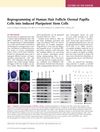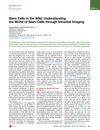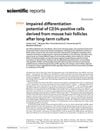 75 citations,
September 2017 in “Developmental biology”
75 citations,
September 2017 in “Developmental biology” The circadian clock influences the behavior and regeneration of stem cells in the body.
 67 citations,
June 2018 in “Engineering in Life Sciences”
67 citations,
June 2018 in “Engineering in Life Sciences” Plant cell culture is a promising method for creating sustainable and high-quality cosmetic ingredients.
 61 citations,
September 2008 in “Stem Cells”
61 citations,
September 2008 in “Stem Cells” Most hair follicle stem cells do not protect their DNA by dividing it unevenly.
 43 citations,
December 2013 in “Stem Cells”
43 citations,
December 2013 in “Stem Cells” Stretching skin increases a certain protein that attracts stem cells, helping skin regeneration.
 41 citations,
September 2010 in “Journal of dermatological science”
41 citations,
September 2010 in “Journal of dermatological science” Bone marrow and umbilical cord stem cells can help grow new hair.
 38 citations,
June 2017 in “The Journal of Dermatology”
38 citations,
June 2017 in “The Journal of Dermatology” Aging in hair follicle stem cells leads to hair graying, thinning, and loss.
 26 citations,
September 2018 in “Journal of Molecular Cell Biology”
26 citations,
September 2018 in “Journal of Molecular Cell Biology” Endoglin is crucial for proper hair growth cycles and stem cell activation in mice.
 26 citations,
February 2012 in “Journal of Investigative Dermatology”
26 citations,
February 2012 in “Journal of Investigative Dermatology” Human hair follicle cells can be successfully transformed into different types of cells, but not more efficiently than other adult cells.
 21 citations,
July 2020 in “Stem Cell Research & Therapy”
21 citations,
July 2020 in “Stem Cell Research & Therapy” Fat stem cells from diabetic mice can still help heal wounds.
 19 citations,
July 2011 in “Microscopy and Microanalysis”
19 citations,
July 2011 in “Microscopy and Microanalysis” The hair follicle bulge is an important area for adult stem cells involved in hair growth and repair, with potential for medical use needing more research.
 19 citations,
January 2008 in “Cold Spring Harbor Symposia on Quantitative Biology”
19 citations,
January 2008 in “Cold Spring Harbor Symposia on Quantitative Biology” A special environment is needed to fully activate sleeping stem cells.
 18 citations,
November 2013 in “Molecules and Cells”
18 citations,
November 2013 in “Molecules and Cells” New culture method keeps human skin stem cells more stem-like.
 17 citations,
December 2014 in “Cell Stem Cell”
17 citations,
December 2014 in “Cell Stem Cell” Intravital imaging helps us better understand stem cells in their natural environment and could improve knowledge of organ regeneration and cancer development.
 15 citations,
July 2021 in “Bosnian Journal of Basic Medical Sciences”
15 citations,
July 2021 in “Bosnian Journal of Basic Medical Sciences” Stem cell therapy is promising for treating various health conditions, but more research is needed to understand its full potential and address challenges.
 15 citations,
June 2015 in “Human Cell”
15 citations,
June 2015 in “Human Cell” Spheroid culture in agarose dishes improves survival and nerve cell growth in thawed human fat-derived stem cells.
 14 citations,
April 2011 in “Cell Proliferation”
14 citations,
April 2011 in “Cell Proliferation” Scientists can grow human hair follicle stem cells in a lab without changing their nature, which could help treat hair loss.
 12 citations,
August 2022 in “Stem cell reviews and reports”
12 citations,
August 2022 in “Stem cell reviews and reports” Increasing PBX1 reduces aging and cell death in hair follicle stem cells by boosting SIRT1 and lowering PARP1 activity.
 9 citations,
February 2014 in “Tissue Engineering and Regenerative Medicine”
9 citations,
February 2014 in “Tissue Engineering and Regenerative Medicine” Conditioned media from human amniotic fluid-derived stem cells helps skin heal and protects against aging from sun exposure.
 5 citations,
January 2016 in “Stem Cells International”
5 citations,
January 2016 in “Stem Cells International” Certain skin cells near the base of hair muscles may help renew and stabilize skin, possibly affecting skin disorder understanding.
 4 citations,
May 2021 in “Biomedicines”
4 citations,
May 2021 in “Biomedicines” Targeting the protein Caveolin-1 might help treat a type of scarring hair loss called Frontal Fibrosing Alopecia.
 4 citations,
November 2011 in “Archives of Dermatology”
4 citations,
November 2011 in “Archives of Dermatology” Hamilton scale imprecise, hair shaft diameter decreases, stem cell transplant regrows hair, ECP ineffective for alopecia areata universalis.
3 citations,
April 2022 in “Research Square (Research Square)” PBX1 reduces aging and cell death in stem cells by boosting SIRT1 and lowering PARP1.
 2 citations,
June 2022 in “Scientific reports”
2 citations,
June 2022 in “Scientific reports” Mouse hair follicle stem cells lose their ability to change into different cell types after being grown for a long time.
 2 citations,
March 2020 in “International Journal of Molecular Sciences”
2 citations,
March 2020 in “International Journal of Molecular Sciences” Topical treatments can deliver active molecules to skin stem cells, potentially helping treat skin and hair disorders, including skin cancers and hair loss.
 2 citations,
November 2015 in “Actas Dermo-Sifiliográficas”
2 citations,
November 2015 in “Actas Dermo-Sifiliográficas” Epidermal stem cells show promise for future dermatology treatments due to ongoing advancements.
 1 citations,
September 2022 in “The journal of investigative dermatology/Journal of investigative dermatology”
1 citations,
September 2022 in “The journal of investigative dermatology/Journal of investigative dermatology” MicroRNA-148a is crucial for maintaining healthy skin and hair growth by affecting stem cell functions.
1 citations,
March 2022 in “IntechOpen eBooks” Aging reduces skin stem cell function, leading to changes like hair loss and slower wound healing.
1 citations,
February 2016 in “Cell Transplantation” Hair follicles have a more inactive cell cycle than other skin cells, which may help develop targeted therapies for skin diseases and cancer.
 October 2023 in “bioRxiv (Cold Spring Harbor Laboratory)”
October 2023 in “bioRxiv (Cold Spring Harbor Laboratory)” Immune cells are essential for early hair and skin development and healing.
 June 2023 in “Stem cell reviews and reports”
June 2023 in “Stem cell reviews and reports” Stem cell therapies could be a promising alternative for hair loss treatment, but more research is needed to understand their full potential and safety.



























